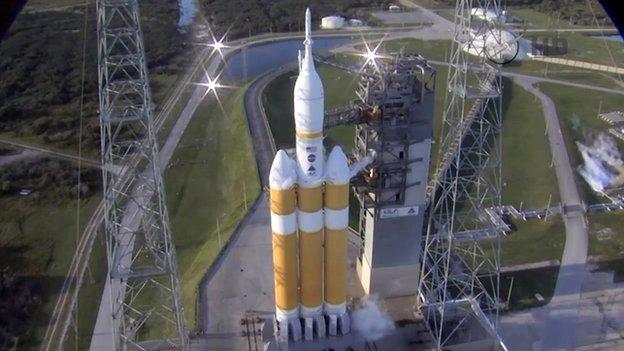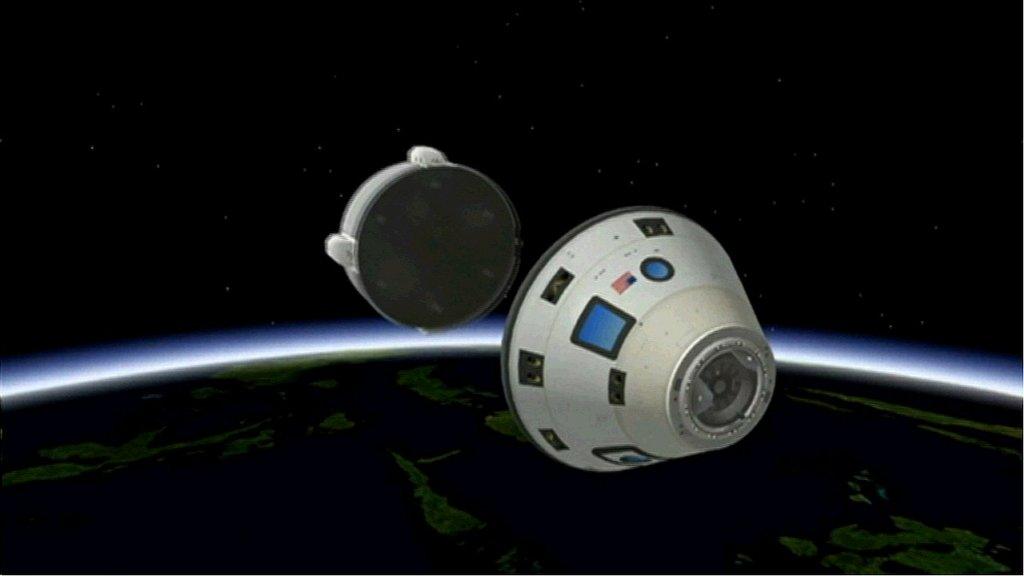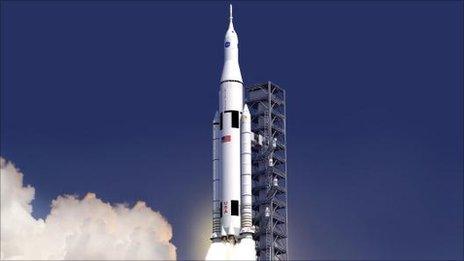Orion 'Mars ship' launch postponed
- Published

The countdown was stopped several times before controllers finally scrubbed the launch for the day
Thursday's first test flight of the US space agency's Orion "Mars ship" has been postponed because of weather and technical issues.
The capsule had been due to launch atop a Delta rocket on a short journey above the Earth to prove key technologies.
Its maiden voyage was to have taken place from Cape Canaveral in Florida between 12:05 GMT and 14:44 GMT.
But the countdown was interrupted by gusty winds and by sluggish fuel valves in the Delta's big boosters.
Engineers will try again on Friday. The launch window will be exactly the same as on Thursday, with the aim as ever to try to get away right at the start of the window at 12:05 GMT (07:05 local Florida time).
"We'll go make sure we've got a happy rocket and as soon as we do that we're going to get back to the pad and send Orion off to a very, very successful test flight," said Dan Collins from the Delta's operating company, United Launch Alliance.
The conical capsule is reminiscent of the Apollo command ships that took men to the Moon in the 1960s and 1970s, but bigger and with cutting-edge systems.
For this demonstration mission, Orion is being flown without people aboard.

The first two delays on Thursday were weather-related (although a cargo ship travelling close to the launch range was a concern for a period, also). Sensors detected unacceptably strong gusts of wind in the vicinity of the rocket at ground level, and this automatically stopped the countdown clock.
A third stop on the clock was caused by sticky fill/drain valves on the rocket's big boosters. These had become excessively cold in the presence of the Delta's liquid hydrogen propellant.
Lockheed Martin, the company developing Orion and running this test flight for Nasa, has another two days to get the mission off the ground before negotiations must take place for an extension.
Other space missions have bookings on the launch complex and they would have to agree to step back, potentially delaying their operations as well. And ULA has a lift-off to manage on the West Coast of the US next week, and this could be impacted if the company's staff are detained in Florida.
Unfortunately, the weather in some respects looks to be less favourable for a Friday attempt.
If it deteriorates further, a decision could be made simply to jump to Saturday. This would save on supplies of liquid hydrogen, some of which is lost every time the rocket is tanked up, while also giving launch crews a bit of rest.
'Big thing'
Orion is being developed alongside a powerful new rocket that will have its own debut in 2017 or 2018.
Together, they will form the core capabilities needed to send humans beyond the International Space Station to destinations such as the Red Planet.
For the time being, the Delta IV-Heavy rocket - currently the beefiest launcher in the world - is being used as a stand-in.
The animation shows how the maiden test voyage of Orion should progress
If all goes well on Friday, the Delta will send Orion twice around the globe, throwing the ship up to an altitude of almost 6,000km (3,600 miles).
This will set up a fast fall back to Earth, with a re-entry speed into the atmosphere close to 30,000km/h (20,000mph) - near what would be expected of a capsule coming back from the Moon.
It should give engineers the opportunity to check the performance of Orion's critical heat shield, which is likely to experience temperatures in excess of 2,000C (4,000F).
They will also watch how the parachutes deploy as they gently lower the capsule into Pacific waters off Mexico's Baja California Peninsula.
Jonathan.Amos-INTERNET@bbc.co.uk and follow me on Twitter: @BBCAmos, external
- Published18 November 2014

- Published16 September 2014

- Published14 September 2011
